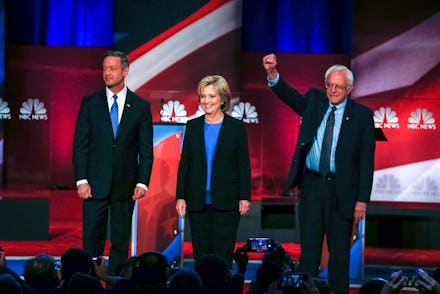South Carolina Minimum Wage 2016: What You Need to Know About Wage Increase Question

On Sunday, minimum-wage earners in Charleston, South Carolina, rallied outside the venue where the three remaining Democratic contenders would take the stage for the final debate before the 2016 presidential primaries. Backed by the national Fight for 15 movement, the crowd comprised of fast food, home care, child care and other workers who currently pull in the state's hourly base rate of $7.25 per hour. Their challenge to the candidates? "Come and get my vote" — by supporting a $15 minimum wage nationwide.
"You can't just say you're with us and not take action," one demonstrating fast food worker, Rachel Nelson, told ThinkProgress. "If they want to be elected as president, if they want my vote and the vote of millions of struggling voters here, they need to get on the right side of history and show me that they're standing by us in our fight for $15 an hour and union rights."
At the start of 2016, 14 states agreed to raise their minimum hourly pay rates, but South Carolina wasn't among them. The South Carolina Minimum Wage Increase Question may appear on the state's 2016 ballot in November. If passed, it would raise the minimum wage one dollar, meaning that the workers who went on strike Sunday would earn either $8.25 or $16.25 in 2017, depending on whom the nation elects as president.
Which is why about 100 of Charleston's low-wage earners walked out of their jobs Sunday and joined the Fight for 15 protest. The South Carolina city is a snapshot of a larger trend within the U.S., as the minimum wage question becomes a decisive factor in the 2016 election. According to USA Today, 48 million people nationwide make less than $15 per hour and would be more inclined to cast their ballots in November if the candidates supported a pay hike.
Presidential hopefuls in both parties are paying attention. Former Secretary of State and Democratic frontrunner Hillary Clinton wants to raise the federal base rate to an hourly $12, and supports organized movements, including Fight for 15, to boost the wage in states and cities. Both Vermont Sen. Bernie Sanders and former Maryland Gov. Martin O'Malley support a $15 minimum wage and workers' right to unionize. O'Malley introduced what he calls a "workers bill of rights" on Thursday, and Sanders introduced $15 federal minimum wage legislation in July. He's also nudged President Barack Obama to back Fight for 15.
The Republican party is less amenable to raising the federal rate. At the November debate in Milwaukee — outside which Fight for 15 had staged a demonstration — real estate mogul Donald Trump, former neurosurgeon Ben Carson and Florida Sen. Marco Rubio all said no to a wage increase. In December, however, Trump changed his tune in response to an allegation by Sanders that the Republican frontrunner thought the minimum wage should stay where it was. "Wages are too low," he tweeted.